Current and recent ASNC undergraudate students share their impressions of life as an ASNC and Cambridge.
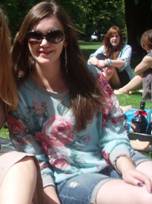
I went to a comprehensive school in Scotland, where I did Advanced Highers in English, History and Music, and I had never seriously thought about applying to somewhere like Cambridge. After leaving high school I spent a year in Holland studying music, and I was thinking about applying for university courses in history or English when I discovered the ASNC course at Cambridge. I liked the sound of it because it combines history, literature and languages, allowing you to study the early medieval period in greater depth than most other courses. I didn't think I had much chance of getting an offer, but I applied anyway, and surprised myself by managing to behave in a relatively calm and normal manner in both interviews. The more background reading I did, the more I became convinced that ASNC was the course I really wanted to do. That opinion still hasn't changed. My first year at Cambridge has been the best experience of my life, and I feel incredibly lucky to be studying something so interesting and enjoyable. I was a little worried that I would be behind in terms of learning languages, since I had never really done any grammar before, but the freshers' induction course was brilliantly helpful and included a crash-course in grammar which made sure nobody was beginning the year at a disadvantage. Students applying for ASNC are not really expected to have any previous knowledge or experience of the subject, but doing a fair amount of background reading definitely helped with the interview. I would highly recommend ASNC to anyone with an interest in history, literature or languages.
Robin, first year

As a Welsh speaker growing up in a bilingual area I had always been fascinated by the history of the languages which surrounded me. My A-Level studies allowed me to pursue that fascination to an extent as I worked through History, Politics, English literature and Welsh courses, but I was always keen to take my interests further into a university environment. The things that really drew me to ASNC were both the astounding versatility of the course and the degree of specialization it offered. ASNC provided me with the perfect opportunity to continue studying the three things I love - language, literature and history - without having to sacrifice any of my interests. Another attractive element was the fascinating and vibrant period we work with; having taken papers in Scandinavian, Anglo-Saxon, Brittonic and Gaelic history I'll happily admit that they are undoubtedly the most exciting and engaging topics I have ever studied. The conflagration and clash of cultures, languages and literatures that took place in the medieval world makes for a riveting field of study and has given me a new and refreshing sense of the history and identity of the islands we live in. I'm also happy to admit that at times the work can be mind-boggling and hugely challenging, especially the linguistic elements of the course which have often had me sitting in the library for hours, poring over tongue-twisting texts and muttering in languages that nobody have spoken for a thousand years! If this sounds appealing then I suppose you know you're destined for an ASNC degree. Studying such a specific course in a Cambridge environment if a fabulous opportunity in itself: we are allowed to become experts in our own, in-depth field whilst immersing ourselves in the all the culture and intellectual stimuli that this beautiful city has to offer. During the course of our three-year degree we truly come to learn a little something about everything, and everything about a little something. That's why I'm glad I study in such a great department as ASNC.
Cefais fy magu fel Cymro Cymraeg mewn ardal hollol ddwyieithog ac roedd wastad gennai ddiddordeb arbennig wrth ddysgu am hanes yr ieithoedd a glywais i o'm amgylch pob dydd. Caniataodd fy newisiadau Lefel A i mi gario ymlaen a'r diddordeb hwn i ryw raddau wrth i mi astudio cyrsiau Hanes, Gwleidyddiaeth, Llenyddiaeth Saesneg a Chymraeg, ond roeddwn wastad yn frwd i ehangu a datblygu fy niddordeb ym mhellach wrth symud at amgylchedd academaidd yn y brifysgol. Yr hyn a ddenodd mi at ASNC oedd natur amlochrog y cwrs yn ogystal â'r manylder a gynigwyd ynddo. Cyflwynodd ASNC gyfle perffaith i mi barhau ymchwil o fewn fy hoff maesydd academaidd - iaith, llenyddiaeth a hanes - heb orfod aberthu unrhyw un o'm ddiddordebau. Elfen arall a ddenodd mi at y cwrs oedd y cyfnod diddorol a bywiog a astudiwyd ynddo; cymerais bapurau ar hanes Sgandinafaidd, Saesneg, Brythoneg a Gwyddeleg ac rwy'n hapus cyfaddef mai dyma'r pynciau mwyaf cyffrous a chymleth rwyf wedi wynebu erioed. Mae ein astudiaeth o'r cyfuniad diwylliannol a'r gwrthdaro di-baid a welwyd yn canol oesoedd yn cynnig cyfle i ni werthfawrogi ein hanes a'n hunaniaeth mewn ffyrdd newydd o hyd. Gall ein gwaith hefyd fod yn hynod o heriol ar adegau, yn enwedig elfennau ieithyddol y cwrs sydd yn aml wedi fy nghadw yn y llyfrgell am oriau yn ffwndro wrth drio deall ieithoedd meirw nad oes neb wedi'u siarad am flynyddoedd maith! Ond i mi, dyma ran o apêl y cwrs: oni heuir ni fedir, ac mae fy hyder yn cynyddu hefo pob sgil a ddysgwyd a phob maes a ddarganfuwyd o'r newydd. Mae'n fraint heb ei ail cael ehangu fy ngwybodaeth a'm profiadau personol wrth astudio ASNC mewn amgylchedd mor gyfoethog ei diwylliant, ei hanes a'i phrydferthwch â dinas Caergrawnt. Rwy'n falch o gael y cyfle i wneud hyn oll fel rhan o'r adran wych hon.
Shelby, second year
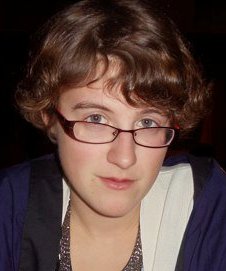
Coming from South Carolina, USA, straight out of high school, I didn't know quite what to look forward to with ASNC and a British university, but the department and Tripos have exceeded any expectations I had. I had always been interested in the origins of the English language, Celtic literature and history, and medieval languages, and ASNC seemed the perfect opportunity to pursue these interests in a holistic way: I've had the opportunity to study not only languages and literatures but also the histories and manuscripts (in one of the most interesting papers of the course, Palaeography) that are so integral to understanding the context of what I read. I took APs (A-level equivalents) in a broad range of subjects in the arts and sciences, but history, English and Latin probably have helped me the most, especially because they taught me how to interpret primary sources and to understand the subtleties of translation and language skills. ASNC has certainly built upon all of those skills and made me such a better writer and reader. The supportive people and small size of the department (the size of my lectures/classes ranges from four to thirty people) mean that I can get one-on-one contact with experts and lecturers on a daily basis and very personalised teaching – something that would be hard to come by in most other universities or courses. The social aspect of the course is also one of its best appeals, because everyone is friendly and welcoming, and the ASNC Society puts on loads of fun social events. But even with all my work and involvement in the ASNC Society and department, I never feel like it's too small or insular, because everyone has a wide range of interests and there are plenty of opportunities in Cambridge to meet people outside of your Tripos.
Ben, second year
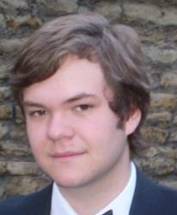
I went to a grammar school in inner-city Birmingham where I studied English literature, History and Government and Politics at A level. I enjoyed these subjects so much that I was keen to apply for a course that would combine different aspects of historical, literary and linguistic study. This and a long-standing fascination with early medieval history made ASNC a natural choice for me, even though I hadn't studied any aspects of the period as part of a school syllabus. The subjects I took at A-level have proved invaluable as they provided me with the essential skills of analysis, debate and critical thinking that I have been able to develop over the past two years.
For me, one of ASNC's great qualities is that the department offers a broad range of papers, allowing students to pursue specific interests right from the start of the degree. Part I allowed me to explore various different aspects of the course which had caught my eye while doing background reading, including Scandinavian history, Palaeography and Codicology and Old English, which allowed me to get to grips with linguistic study despite not having studied a language since GCSE.
The department has a uniquely friendly and accessible atmosphere, forming a tight-knit but welcoming community of lecturers and students, on top of which there are regular social events, such as ASNC lunch every Monday and ASNC pub every Friday, which allow everybody to get to know one another, with close friendships forming within the first few weeks of first year. I have loved every moment of my ASNC experience so far and would thoroughly recommend it to anyone who is thinking of applying!
Moa, third year
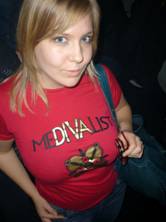
Before enrolling at Cambridge, I had been taught exclusively at Swedish state schools. This presented an obvious challenge as I had to immerse myself in the UK educational system, which is very much based on essay-writing and end-of-year exams, as well as getting used to being taught through the medium of English. By the beginning of my second year, however, I had become used to the system and also had a year's worth of knowledge of the papers I was taking, so by that point there weren't any obvious signs that I was from a different system (and culture) than my peers. Having a Scandinavian background definitely has its benefits in ASNC, as it gives you a strong advantage in studying Old Norse language and literature, as well as in Scandinavian history in the Viking Age. I did the Social Sciences programme (Samhällsvetenskapliga programmet) at secondary school, so I had come across topics such as Snorra Edda, the Icelandic Sagas and the Norwegian dynasty beginning with Harald Fairhair before. I did, however, find myself floating into the Celtic realm via Medieval Welsh (which isn't as terrifyingly difficult as it sounds)! I can recommend ASNC to someone who appreciates a multi-disciplinary course, as this is very much what ASNC is about: history, language and literature all combine to give you a fuller picture of the cultures we study, from Scandinavia to Ireland. If you also don't mind fantastic lecturers who are always happy to help, a great bunch of people who like the same things you do and a department society that uses a mead-horn in its initiation rite, you'll probably fit right in at ASNC!
Robin, third year
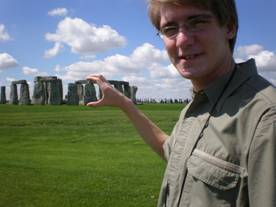
After three years studying ASNC, I can confidently say that they were some of the best years of my life. I'm a third-year finalist but fresher's week still feels like it was only yesterday. Back then, ASNC was a daunting prospect – exciting and terrifying at the same time. But appearances can be deceptive. Hailing from a state grammar school in Lincolnshire and having never studied medieval history or languages, I had no idea what to expect from ASNC or the university as a whole. It was a pleasant surprise to find that the course was challenging rather than impossible. This was chiefly due to the fact that ASNC is a small close-knit community of undergraduates, graduates and fellows, where everyone knows one another and is easily approachable – personally and geographically, since the staff offices are located next to the Common Room in the department. This creates a network of academic support unparalleled in most (if not all) other university courses. You can moan to your friends as much as you can moan to your supervisors…because they are your friends. ASNC life extends beyond the academic: the Society organises numerous events and a free magazine (Gesta Asnacorum) which have really helped make my time at Cambridge exceptional.
I left school with A-levels in History, English Language & Literature and French (and Geography at AS-level). I was attracted to ASNC because of my keen interest in all things Celtic; although if I've learned one thing at university, it's that what makes something ‘Celtic' is near-impossible to define. Nonetheless I found myself enjoying Anglo-Saxon history as much as Gaelic history, and enjoying Old English as much as Old French. The diversity of papers and skills offered by ASNC makes it unique, and I couldn't have chosen a better course for combining history, languages and literature studies – supplemented by the opportunity to borrow archaeology papers and take dissertations in an area of your choice – in a way that brings medieval European culture to life that would make Horrible Histories jealous. Choose ASNC; you won't regret it, or forget it.
Albert, recent student

I studied A-Levels in English Literature, French, History and Philosophy at a state school in Folkestone, Kent. I was keen to continue the study of history, literature and languages at university level since I had always been interested by these disciplines and how they interact. I was also intrigued by the period and cultures covered by the ASNC tripos – subjects which I hadn't encountered at A-Level, with its emphasis on modern history. In my first and second years I took the Brittonic, Anglo-Saxon and Scandinavian History papers, which were well complemented by the study of Old English. I also had the opportunity to study early French literature, thought and history – a ‘borrowed' paper from the MML tripos. The third year allows further specialisation, so I will be able to focus mainly on historical papers.
The subject is taught by a mixture of lectures, classes and weekly supervisions – all of which provide a great amount of contact time per week and plenty of opportunity to discuss points of interest with tutors and lecturers. Being a small department, you get to know your fellow students well which is rare for other subjects, and the Anglo-Saxon, Norse, and Celtic Society is one of the most active subject societies in Cambridge, organising excursions, lectures and so on to supplement your studies.
Hannah, recent student
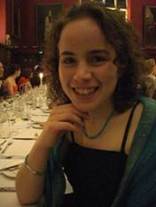
As a final-year student of ASNC I can look back on my degree and say that my years spent here have been some of the best of my life so far. I'm originally from Salisbury in Wiltshire, and I took A-levels in English Literature, German and Politics, all of which have helped me in this degree with analysis of literary texts, learning of languages and the ability to hold my own in a debate (vital for essays, classes and even the common room occasionally!) When I first came here I decided to specialise in the Germanic side of things and this has continued into my final year. One of the best things about ASNC is the variety, combined with the high degree of specialism. It's really exciting to be able to tread new ground as well; sometimes you look at subjects that very few people have studied before. This means you can often be saying something totally original at undergraduate level, which is very rare in other subjects. The ASNC department is a lively and friendly place, combining excellent teaching with a sense of fun. All in all, it's a great course with a wonderful academic and social atmosphere. So if you're wondering about applying...go for it!
As a final-year student of ASNC I can look back on my degree and say that my years spent here have been some of the best of my life so far. I'm originally from Salisbury in Wiltshire, and I took A-levels in English Literature, German and Politics, all of which have helped me in this degree with analysis of literary texts, learning of languages and the ability to hold my own in a debate (vital for essays, classes and even the common room occasionally!) When I first came here I decided to specialise in the Germanic side of things and this has continued into my final year. One of the best things about ASNC is the variety, combined with the high degree of specialism. It's really exciting to be able to tread new ground as well; sometimes you look at subjects that very few people have studied before. This means you can often be saying something totally original at undergraduate level, which is very rare in other subjects. The ASNC department is a lively and friendly place, combining excellent teaching with a sense of fun. All in all, it's a great course with a wonderful academic and social atmosphere. So if you're wondering about applying...go for it!
Owain, recent student
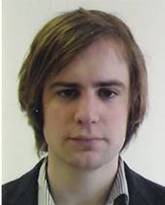
I'm from Swansea, South Wales and I took English Literature, Welsh and History for A-Level. My A-levels prepared me reasonably well for ASNC, through historical methodology and literary criticism. My main preparation, however, was the interest I took and the general reading I did in the subject beforehand. The main exception here was the Welsh A-level, which was excellent preparation for the Medieval Welsh paper in ASNC since you study a few of the same texts.
I loved the atmosphere in the department; you find you get to know your fellow students fairly quickly and in my year we formed a close group of friends. Teaching in the department is excellent, but an extra aspect is the closeness of the department and the accessibility of the lecturers, especially given the proximity of their offices to the common room. I felt that I could just pop my head round the door of someone's office with any query and whoever it was would be glad to answer.
The student community is great, bound together by events such as the weekly pub night (encouraged but not obligatory!), a weekly lunch in the common room and a couple of annual trips. It's easy to get involved in the subject socially as well as academically, which means that even if you're the only ASNC in your college (as I was), you certainly won't lack friends in your subject.
and for you Welsh speakers...
Dwi'n dod o Abertawe a mynychais i Ysgol Gyfun Gwyr, le gymerais i Llenyddiaeth Saesneg, Cymraeg a Hanes mewn lefel A. Roedd y cyrsiau hyn eithaf defnyddiol fel paratoad am ASNC gan ddysgais i hanesyddiaeth cyffredinol a sut i ddehongli llenyddiaeth. Ond ni fydd unrhyw gyfuniad o lefelau A yn eich paratoi yn llwyr am y cwrs, a'r diddordeb a gymerais yn y pwnc ymlaen llaw oedd fy mhrif baratoad. Yr eithriad i'r reol oedd y cwrs Cymraeg, a oedd yn baratoad ardderchog ar gyfer y papur Cymraeg Canoloesol gan ein bod yn astudio nifer o'r un chwedlau a cherddi. Mae'n help mawr i gael y profiad o astudio testunau o'r cyfnod ymlaen llaw.
Mae gan yr adran naws gyfeillgar a cefnogol iawn. Yn fy mlwyddyn i ffurfion ni grwp o gyfeillion agos iawn, a mae'n hawdd i ddod i nabod eich cyd-fyfyrwyr yn gyflym iawn. Mae safon y dysgu o fewn yr adran yn rhagorol, ac ynghyd a hwn mae'r adran yn un agos iawn a'r darlithwyr yn gyfeillgar. Gan fod swyddfeydd y darlithwyr yn amgylchu lolfa o fewn yr adran, ni theimlais yn nerfus o gwbl yn gofyn unrhyw gwestiwn, dim ots pa mor fach oedd e.
Mae'r teimlad cymdeithasol ymysg y myfyrwyr yn andros o dda, yn cael ei hybu trwy ddigwyddiadau fel y nosweth wythnosol yn Nhafarn y Castell, cinio wythnosol yn y lolfa a'r dau drip blynyddol. Mae'n hawdd i gymryd ran ym mywyd cymdeithasol yr adran yngyd a'r ochr academaidd. Fi oedd yr unig ASNC yn fy ngoleg ond roedd digon o fy ffrindiau yn astudio'r un cwrs.
Clare, recent student
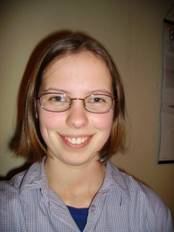
I went to a state school in Oxfordshire and took A-levels in English Literature, French and Religious Studies. I hadn't thought about university courses when I chose them, but they gave me a good background in grammar and translation, and thinking critically about texts and sources. I decided to apply for ASNC because of the variety of languages it offers - some that I would never have had the chance to study otherwise - and also to learn about a period of history rarely covered at school.
In Part I, I have been taking all the language papers and Palaeography, which is quite a lot of ongoing work but very rewarding. I like the variety of subjects the course includes: it might initially seem very specialised, but in two years it feels like I've already studied a broad range of topics, most of which I had never considered before. Another good aspect is that students have a lot of contact time with staff in the form of lectures, classes, supervisions and revision sessions – it makes you feel very supported. The small size of the department means that there is a friendly atmosphere, and it is easy to approach staff and other students.
I should also mention that ASNCs are a social bunch. I have made some good friends in the department, and plenty of fun events take place, both work-related and otherwise.
Anne, recent student
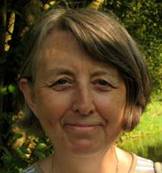
I am perhaps not an obvious undergraduate. Originally from Yorkshire, my working life was spent in London or overseas. When I retired from my post as a Senior Civil Servant, I hoped to follow a long-time interest in Anglo-Saxon History. But I wanted to do so holistically, picking up also on what the language and literature, and history of the countries which impacted closely on England at that time, could tell us. Uniquely, the Cambridge ASNC course offers that focus. I have been able to combine Anglo-Saxon, Scandinavian and Brittonic history with Old English, Old Norse and Latin, including their related literatures.
When applying to Cambridge, I doubted A-levels that were over 40 years old would impress and hoped workplace skills of analysis and report writing, together with the ability to study, demonstrated by taking pre-entry courses, would assist. These alternatives have proved very helpful but I also find my A-level combination of History, German and Latin optimum for ASNC - especially as I had learned English grammar which, with German, is invaluable in studying Old English and Old Norse. I had some experience of analysing historical sources and of language-learning and, surprisingly, found Latin easier to return to than expected. The ASNC teaching, through history lectures, language classes and a programme of supervised weekly essays suits the course focus, introducing me to the topics I wish to learn and allowing me to develop that learning in my own way. The key advantage is that the ASNC department is small; supervisions are one on one, and friendly, so I quickly felt ‘at home'.

